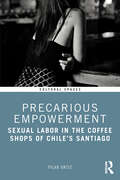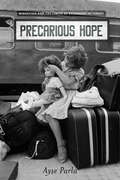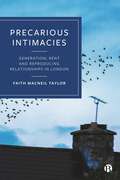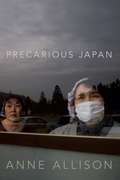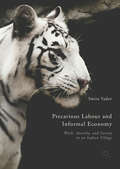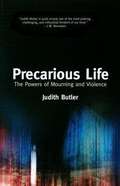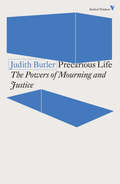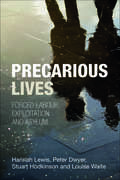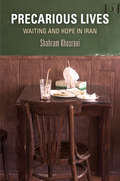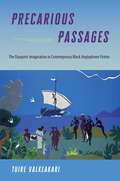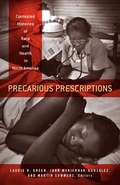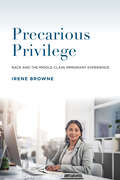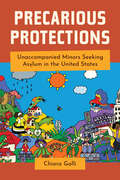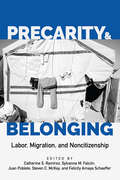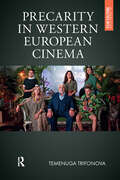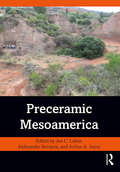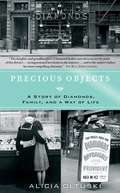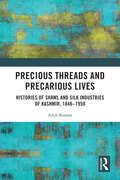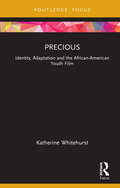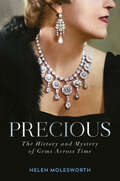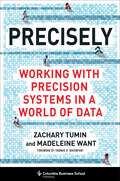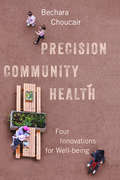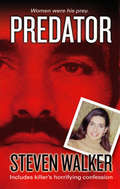- Table View
- List View
Precarious Eating: Narrating Environmental Harm in the Global South
by Ben Jamieson StanleyThe role of food and hunger in contemporary South African and Indian environmental writing From GMOs to vegetarianism and veganism, questions of what we should (and shouldn&’t) eat can be frequent sources of debate and disagreement. In Precarious Eating, Ben Jamieson Stanley asks how recentering global South representations of food might shift understandings of environmental precarity. Precarious Eating follows the lead of writers and thinkers in South Africa and India who are tracing the production and consumption of food, exploring ways to reconnect our narratives about climate change, global capitalism, and social justice. Taking up a diverse range of novels, films, scholar/activist writings, intellectual histories, and cookbooks, Stanley connects the ethics of eating to histories of empire and apartheid, uneven globalization, gender and sexuality, and global South experiences of climate change. They shift the lens of environmental humanities from climate-focused paradigms developed in the global North to food-focused environmental culture and activism in the South, addressing topics that range from foraging and farmer suicides to disordered eating and queer intimacy. By highlighting authors, activists, and environments of the global South, Precarious Eating joins with scholarship from postcolonial, decolonial, Indigenous, and Black studies to underscore how capitalism and empire shape our planetary environmental crisis. Retail e-book files for this title are screen-reader friendly with images accompanied by short alt text and/or extended descriptions.
Precarious Empowerment: Sexual Labor in the Coffee Shops of Chile's Santiago (Cultural Spaces)
by Pilar OrtizPrecarious Empowerment: Sexual Labor in the Coffee Shops of Chile’s Santiago provides a textured and telling exploration into the lives and experiences of sex workers in Chile, their encounters with discrimination and economic precarity, and their empowered resistance.Set in and around ‘tinted cafes’—spaces hidden from public view where women dance for their male clients and perform sexual services—within Chile’s capital city of Santiago, author Pilar Ortiz traces connections between sex work in the present day and the lasting legacies of colonialism and gender and sexual norms. Drawing on her careful ethnographic observations and in-depth interviews with the workers and their clients, the book reveals the many challenges women face at the intersection of class, racial, and gender inequalities. It also documents their resistance to stigma and stifling social norms and predetermined gender roles. In their practice of sexual labor, the book argues that women display a considerable degree of agency, mobility, and empowerment. Within this contentious space, the author explores how sex workers negotiate inequalities and exclusion and how they are poised to do so in a rapidly changing political and social climate.Exploring experiences of exploitation and resistance within Chile, this book speaks to the much larger question of agency versus oppression in conversations about sexual labor worldwide. Its compelling analysis will captivate those interested in scholarly studies of sexual labor and the ways it is performed and shaped across hierarchies of race, class, and gender.
Precarious Hope: Migration and the Limits of Belonging in Turkey
by Ayse ParlaThere are more than 700,000 Bulgaristanlı migrants residing in Turkey. Immigrants from Bulgaria who are ethnically Turkish, they assume certain privileges because of these ethnic ties, yet access to citizenship remains dependent on the whims of those in power. Through vivid accounts of encounters with the police and state bureaucracy, of nostalgic memories of home and aspirations for a more secure life in Turkey, Precarious Hope explores the tensions between ethnic privilege and economic vulnerability and rethinks the limits of migrant belonging among those for whom it is intimated and promised—but never guaranteed. In contrast to the typical focus on despair, Ayşe Parla studies the hopefulness of migrants. Turkish immigration policies have worked in lockstep with national aspirations for ethnic, religious, and ideological conformity, offering Bulgaristanlı migrants an advantage over others. Their hope is the product of privilege and an act of dignity and perseverance. It is also a tool of the state, reproducing a migration regime that categorizes some as desirable and others as foreign and dispensable. Through the experiences of the Bulgaristanlı, Precarious Hope speaks to the global predicament in which increasing numbers of people are forced to manage both cultivation of hope and relentless anxiety within structures of inequality.
Precarious Intimacies: Generation, Rent and Reproducing Relationships in London
by Faith MacNeil TaylorIn a time of increasing social and economic inequality, this book illustrates the precarity experienced by millennials facing both rising rents and wage stagnation. Featuring the voices of those with lived experience of precarity in north-east London, MacNeil Taylor focuses on intimacy, reproduction and emotional labour. The book widens readers’ understanding of a middle-class ‘generation rent’ beyond those locked out of anticipated home ownership by considering both social and private renters. Situated in a feminist and queer theoretical framework, the book reveals the crucial role of British policy-making on housing, welfare, and immigration in exacerbating inter- and intra-generational inequality.
Precarious Japan
by Anne AllisonIn an era of irregular labor, nagging recession, nuclear contamination, and a shrinking population, Japan is facing precarious times. How the Japanese experience insecurity in their daily and social lives is the subject of Precarious Japan. Tacking between the structural conditions of socioeconomic life and the ways people are making do, or not, Anne Allison chronicles the loss of home affecting many Japanese, not only in the literal sense but also in the figurative sense of not belonging. Until the collapse of Japan's economic bubble in 1991, lifelong employment and a secure income were within reach of most Japanese men, enabling them to maintain their families in a comfortable middle-class lifestyle. Now, as fewer and fewer people are able to find full-time work, hope turns to hopelessness and security gives way to a pervasive unease. Yet some Japanese are getting by, partly by reconceiving notions of home, family, and togetherness.
Precarious Labour and Informal Economy: Work, Anarchy, and Society in an Indian Village
by Smita YadavAn empirical account of one of India’s largest indigenous populations, this book tells the story of the Gonds—who currently face displacement and governmental control of the region’s forests, which has crippled their economy. Rather than protesting and calling for state intervention, the Gonds have turned toward an informal economy: they not only engage with flexible forms of work, but also bargain for higher wages and experience agency and autonomy. Smita Yadav conceives of this withdrawal from the state in favour of precarious forms of work as an expression of anarchy by this marginalized population. Even as she provides rich detail of the Gonds’ unusual working lives, which integrate work, labour, and debt practices with ideologies of family and society, Yadav illustrates the strength required to maintain dignity when a welfare state has failed.
Precarious Life: The Powers of Mourning and Violence
by Judith ButlerFive essays by Butler (rhetoric and comparative literature, U. of California-Berkeley) respond to the conditions of heightened vulnerability and aggression that followed the events of September 11, 2001. They reflect on explanation and exoneration; violence, mourning, and politics; indefinite detention; charges of anti-Semitism; and a non-violent ethics based on an understanding of how easily human life is annulled.
Precarious Life: The Powers of Mourning and Violence
by Judith ButlerIn this profound appraisal of post-September 11, 2001 America, Judith Butler considers the conditions of heightened vulnerability and aggression that followed from the attack on the US, and US retaliation. Judith Butler critiques the use of violence that has emerged as a response to loss, and argues that the dislocation of first-world privilege offers instead a chance to imagine a world in which that violence might be minimized and in which interdependency becomes acknowledged as the basis for a global political community.Butler considers the means by which some lives become grief-worthy, while others are perceived as undeserving of grief or even incomprehensible as lives. She discusses the political implications of sovereignty in light of the prisoners in Guantanamo Bay. She argues against the anti-intellectual current of contemporary US patriotism and the power of censorship during times of war. Finally, she takes on the question of when and why anti-semitism is leveled as a charge against those who voice criticisms of the Israeli state. She counters that we have a responsibility to speak out against both Israeli injustices and anti-semitism, and argues against the rhetorical use of the charge of anti-semitism to quell public debate.In her most impassioned and personal book to date, Judith Butler responds to the current US policies to wage perpetual war, and calls for a deeper understanding of how mourning and violence might instead inspire solidarity and a quest form global justice.
Precarious Lives: Forced Labour, Exploitation and Asylum
by Peter Dwyer Hannah LewisAvailable Open Access under CC-BY-NC-ND licence This ground breaking book presents the first evidence of forced labour among displaced migrants who seek refuge in the UK. Through a critical engagement with contemporary debates about precarity, unfreedom and socio-legal status, the book explores how asylum and forced labour are linked, and enmeshed in a broader picture of modern slavery produced through globalised working conditions. Drawing on original evidence generated in fieldwork with refugees and asylum seekers, this is important reading for students and academics in social policy, social geography, sociology, politics, refugee, labour and migration studies, and policy makers and practitioners working to support migrants and tackle forced labour.
Precarious Lives: Waiting and Hope in Iran
by Shahram KhosraviIn Precarious Lives, Shahram Khosravi attempts to reconcile the paradoxes of Iranians' everyday life in the first decade of the twenty-first century. On the one hand, multiple circumstances of precarity give rise to a sense of hopelessness, shared visions of a futureless tomorrow, widespread home(land)lessness, intense individualism, and a growth of incivilities. On the other, daydreaming and hope, as well as civility and solidarity in political protests, street carnivals, and social movements, continue to persist. Young Iranians describe themselves as being stuck in purposelessness and forced to endure endless waiting, and they are also aware that they are perceived as unproductive and a burden on their society. Despite the aspirations and inspiration they possess, they find themselves forced into petrifying social and spatial immobility. Uncertainty in the present, a seemingly futureless tomorrow: these are the circumstances that Khosravi explores in Precarious Lives.Creating an intricate and moving portrait of contemporary Iranian life, Khosravi weaves together individual stories, government reports, statistics, and cultural analysis of art and literature to depict how Iranians react to the experience of precarity and the possibility of hope. Drawing on extensive ethnographic engagement with youth in Tehran and Isfahan as well as with migrant workers in rural areas, Khosravi examines the complexities and contradictions of everyday life in Iran. Precarious Lives is a vital work of contemporary anthropology that serves as a testament to the shared hardship and hope of the Iranian people.
Precarious Passages: The Diasporic Imagination in Contemporary Black Anglophone Fiction
by Tuire ValkeakariPrecarious Passages unites literature written by members of the far-flung Black Anglophone diaspora. Rather than categorizing novels as simply "African American," "Black Canadian," "Black British," or "postcolonial African Caribbean," this book takes an integrative approach: it argues that fiction creates and sustains a sense of a wider African diasporic community in the Western world. Tuire Valkeakari analyzes the writing of Toni Morrison, Caryl Phillips, Lawrence Hill, and other contemporary novelists of African descent. She shows how their novels connect with each other and with defining moments in the transatlantic experience, most notably the Middle Passage and enslavement. The lives of their characters are marked by migration and displacement. Their protagonists yearn to experience fulfilling human connection in a place they can call home. Portraying strategies of survival, adaptation, and resistance across the limitless varieties of life experiences in the diaspora, these novelists continually reimagine what it means to share a Black diasporic identity.
Precarious Prescriptions: Contested Histories of Race and Health in North America
by Laurie B. Green, John McKiernan-González, and Martin SummersIn Precarious Prescriptions, Laurie B. Green, John Mckiernan-González, and Martin Summers bring together essays that place race, citizenship, and gender at the center of questions about health and disease. Exploring the interplay between disease as a biological phenomenon, illness as a subjective experience, and race as an ideological construct, this volume weaves together a complicated history to show the role that health and medicine have played throughout the past in defining the ideal citizen.By creating an intricate portrait of the close associations of race, medicine, and public health, Precarious Prescriptions helps us better understand the long and fraught history of health care in America.Contributors: Jason E. Glenn, U of Texas Medical Branch at Galveston; Mark Allan Goldberg, U of Houston; Jean J. Kim; Gretchen Long, Williams College; Verónica Martínez-Matsuda, Cornell U; Lena McQuade-Salzfass, Sonoma State U; Natalia Molina, U of California, San Diego; Susan M. Reverby, Wellesley College; Jennifer Seltz, Western Washington U.
Precarious Priviledge: Race and the Middle-Class Immigrant Experience
by Irene BrowneIn recent years crackdowns on immigrant labor and a shrinking job market in California, Arizona, and Texas have pushed Latine immigrants to new destinations, particularly places in the American South. Although many of these immigrants work in manufacturing or food-processing plants, a growing number belong to the professional middle class. These professionals find that despite their privileged social class and regardless of their national origin, many non-Latines assume that they are undocumented working-class Mexicans, the stereotype of the “typical Latine.” In Precarious Privilege, sociologist Irene Browne focuses on how first-generation middle-class Mexican and Dominican immigrants in Atlanta respond to this stigmatizing assumption. Browne finds that when asked to identify themselves by race, these immigrants either reject racial identities entirely or draw on belief systems from Mexico and the Dominican Republic that emphasize European-indigenous mixed race identities. When branded as typical Latines in the U.S., Mexican middle-class immigrants emphasize their social class or explain that a typical Latine can be middle-class, while Dominicans simply indicate that they are not Mexican. Rather than blame systemic racism, both Mexican and Dominican middle-class immigrants often attribute misperceptions of their identity to non-Latines’ ignorance or to individual Latines’ lack of effort in trying to assimilate. But these middle-class Latine immigrants do not simply seek to position themselves on par with the U.S.-born white middle class. Instead, they leverage their cosmopolitanism—for example, their multilingualism or their children’s experiences traveling abroad—to engage in what Browne calls “one-up assimilation,” a strategy that aims to position them above the white middle class, who are often monolingual and unaware of the world outside the United States. Middle-class Latines’ cosmopolitanism and valuing of diversity also lead them to have cordial relations with African Americans, but these immigrants do not see themselves as sharing African Americans’ status as oppressed minorities. Although the stereotype of the typical Latine has made middle-class Latine immigrants susceptible to stigma, they insist that this stigma does not play a significant role in their lives. In many cases, they view the stereotype as a minor issue, feel that opportunities for upward mobility outweigh any negative experiences, or downplay racism by emphasizing their class privilege. Browne observes that while downplaying racism may help middle-class Latine immigrants maintain their dignity, it also perpetuates inequality by reinforcing the lower status of working-class undocumented immigrants. It is thus imperative, Browne argues, to repeal harsh anti-immigration policies, a move that will not only ease the lives of the undocumented but also send a message about who belongs in the country. Offering a nuanced exploration of how race, social class, and immigration status intersect, Precarious Privilege provides a complex portrait of middle-class Latine immigrants in the United States today.
Precarious Protections: Unaccompanied Minors Seeking Asylum in the United States
by Chiara GalliMore children than ever are crossing international borders alone to seek asylum worldwide. In the past decade, over a half million children have fled from Central America to the United States, seeking safety and a chance to continue lives halted by violence. Yet upon their arrival, they fail to find the protection that our laws promise, based on the broadly shared belief that children should be safeguarded. A meticulously researched ethnography, Precarious Protections chronicles the experiences and perspectives of Central American unaccompanied minors and their immigration attorneys as they pursue applications for refugee status in the US asylum process. Chiara Galli debunks assumptions about asylum, including the idea that people are being denied protection because they file bogus claims. In practice, the United States interprets asylum law far more narrowly than what is necessary to recognize real-world experiences of escape from life-threatening violence. This is especially true for children from Central America. Galli reveals the formidable challenges of lawyering with children and exposes the human toll of the US immigration bureaucracy.
Precarity and Belonging: Labor, Migration, and Noncitizenship (Latinidad: Transnational Cultures in the United States)
by Catherine S. RamírezPrecarity and Belonging examines how the movement of people and their incorporation, marginalization, and exclusion, under epochal conditions of labor and social precarity affecting both citizens and noncitizens, have challenged older notions of citizenship and alienage. This collection brings mobility, precarity, and citizenship together in order to explore the points of contact and friction, and, thus, the spaces for a possible politics of commonality between citizens and noncitizens.The editors ask: What does modern citizenship mean in a world of citizens, denizens, and noncitizens, such as undocumented migrants, guest workers, permanent residents, refugees, detainees, and stateless people? How is the concept of citizenship, based on assumptions of deservingness, legality, and productivity, challenged when people of various and competing statuses and differential citizenship practices interact with each other, revealing their co-constitutive connections? How is citizenship valued or revalued when labor and social precarity impact those who seemingly have formal rights and those who seemingly or effectively do not? This book interrogates such binaries as citizen/noncitizen, insider/outsider, entitled/unentitled, “legal”/“illegal,” and deserving/undeserving in order to explore the fluidity--that is, the dynamism and malleability--of the spectra of belonging.
Precarity in Western European Cinema (Film Culture in Transition)
by Temenuga TrifonovaThis book explores the new European cinema of precarity, with a particular focus on Western European films, by revisiting some of its most important precursors, including 1930s Popular Front films and 1990s French New Realism, Italian neorealism, and the British New Wave. It identifies dominant themes and motifs in contemporary films and their precursors, as well as important continuities and discontinuities between earlier and later representations of work, class, class struggle, solidarity, precarity, the moral economy of capitalism and neoliberalism and their affective pathologies. Trifonova examines the ways in which the cinema of precarity mediates economic and social capital in the age of neoliberalism and considers whether these films lend validity to Guy Standing’s idea of the precariat as “the new dangerous class.”
Preceramic Mesoamerica
by Jon C. LohsePreceramic Mesoamerica delivers cutting-edge research on the Mesoamerican Paleoindian and Archaic periods. The chapters address a series of fundamental questions in American archaeology including the peopling of the Americas, human adaptations to late glacial landscapes, the Neolithic transition, and the origins of sedentism and early village life. This volume presents innovative and previously unpublished research on the Paleoindian and Archaic periods and evaluates current models in light of new findings. Examples include breakthroughs in dating Mesoamerica’s earliest sites and their implications for models of hemispheric colonization; the transition to postglacial patterns of settlement and subsistence; divergent pathways to initial sedentism; the possibility of Archaic-period monumentality; changing patterns of interregional exchange and interaction; and debates surrounding the origins of agriculture, ceramics, and full-time village life. The volume provides a new perspective on the Mesoamerican Preceramic for students and scholars in archaeology, anthropology, and history. Readers will come to understand how the Preceramic contributed to the emergence of the cultural traditions that anthropologists recognize as Mesoamerica.
Precious Objects
by Alicia OltuskiIn the middle of New York City lies a neighborhood where all secrets are valuable, all assets are liquid, and all deals are sealed with a blessing rather than a contract. Welcome to the diamond district. Ninety percent of all diamonds that enter America pass through these few blocks, but the inner workings of this mysterious world are known only to the people who inhabit it. In Precious Objects, twenty-six-year-old journalist Alicia Oltuski, the daughter and granddaughter of diamond dealers, seamlessly blends family narrative with literary reportage to reveal the fascinating secrets of the diamond industry and its madcap characters: an Elvis-impersonating dealer, a duo of diamond-detective brothers, and her own eccentric father. With insight and drama, Oltuski limns her family's diamond-paved move from communist Siberia to a displaced persons camp in post-World War II Germany to New York's diamond district, exploring the connections among Jews and the industry, the gem and its lore, and the exotic citizens of this secluded world. Entertaining and illuminating, Precious Objects offers an insider's look at the history, business, and society behind one of the world's most coveted natural resources, providing an unforgettable backstage pass to an extraordinary and timeless show.
Precious Objects: A Story of Diamonds, Family, and a Way of Life
by Alicia OltuskiIn the middle of New York City lies a neighborhood where all secrets are valuable, all assets are liquid, and all deals are sealed with a blessing rather than a contract. Welcome to the diamond district. Ninety percent of all diamonds that enter America pass through these few blocks, but the inner workings of this mysterious world are known only to the people who inhabit it. In Precious Objects, twenty-six-year-old journalist Alicia Oltuski, the daughter and granddaughter of diamond dealers, seamlessly blends family narrative with literary reportage to reveal the fascinating secrets of the diamond industry and its madcap characters: an Elvis-impersonating dealer, a duo of diamond-detective brothers, and her own eccentric father. With insight and drama, Oltuski limns her family's diamond-paved move from communist Siberia to a displaced persons camp in post-World War II Germany to New York's diamond district, exploring the connections among Jews and the industry, the gem and its lore, and the exotic citizens of this secluded world. Entertaining and illuminating, Precious Objects offers an insider's look at the history, business, and society behind one of the world's most coveted natural resources, providing an unforgettable backstage pass to an extraordinary and timeless show.
Precious Threads and Precarious Lives: Histories of Shawl and Silk Industries of Kashmir, 1846–1950
by Amit KumarThis book studies the hitherto unexplored history of the shawl and silk industries of the himalyan state of Jammu and Kashmir, India. It focuses on the three processes – production, circulation, and consumption – of the textile industry of the region to highlight its socio-economic and political importance in 19th- and 20th-century Kashmir. Using the micro-history approach, it studies the sites of production – the home looms or the small karkhana – efficiency of labour, and innovations by weavers in their techniques to suit the demands of the market. It also locates the impact colonialism had on transforming the labour economy in the Kashmir textile industry. Further, it compares these karkhanas with the Scottish factories or home looms to illuminate many sites of difference and comparison between the working styles and technologies. Mapping a history as complex as the weave on the finest Kashmiri shawl, this book brings to life the interface between culture, commodity, and colonial networks. It will be of great interest to scholars and researchers of South Asian history, colonial and imperial history, cultural studies, and economic and labour history.
Precious: Identity, Adaptation and the African-American Youth Film (Cinema and Youth Cultures)
by Katherine WhitehurstExamining how the discourses of youth, race, poverty and identity take shape when Push is adapted to the big screen, this book brings together valuable research to delve into representations of African-American girlhood. The book draws attention to how Black girlhood takes shape in the film under the dominant White discourses that racialise non-White bodies, and examines how these discourses inform a critical reception of the film and Precious, as a Black girl. Through a consideration of Black culture and heritage, it questions what narratives of girlhood, growth and development are afforded to the main character, in a film that is informed by neoliberal and colour-blind discourses. Highlighting the social context in which Precious was received, the book draws attention to how a discussion of Precious in the critical press gives insight into the racial politics that were dominant at the time of the film’s release. It considers whether race impacts how the film engages with, reflects and moves beyond conventions within the genre of youth film. Concise and engaging, this vital book sheds light on underrepresented areas of film studies that make it an invaluable resource for students and scholars of film, race and youth cultures.
Precious: The History and Mystery of Gems Across Time
by Helen MolesworthA renowned jewelry expert recounts her career working with nature&’s most extraordinary treasures—gemstones—and traces these rare jewels from ancient Egyptian records through the high-stakes auctions of today.Helen Molesworth has been captivated by precious stones since early childhood but she struggled to join the gemstone industry, having no connections to the few family-run companies that have dominated the field for centuries. She persevered, and more than two decades later, Molesworth is now an international authority hired to appraise the extraordinary jewelry of such clients as the British royal family. Precious is packed with inside stories about fabulous jewels associated with generations of celebrities, from Cleopatra (emerald) to Catherine, Princess of Wales (sapphire); from Marilyn Monroe (pearl) to Beyoncé (garnet); from Jackie O (pearl) to Lady Gaga (diamond); and from Marie Antoinette (pearl) to Elizabeth Taylor (pearl, ruby, and emerald)! As Molesworth tells it, the history of gemstones is the history of humanity. And so she journeys the world, navigating African diamond mines, Colombian emerald mines, and the sapphire-rich rivers of Sri Lanka to study gems at their source. She has selected ten of nature&’s most dazzling gems, tracing their discovery to when these cut-and-polished masterpieces first adorned empresses and kings. From the stories of a priceless emerald watch hidden under floorboards for centuries to the common quartz fashioned into world-famous royal jewels, and diamonds selling for multi-millions, Precious is not just a chronicle of archeology and geology, high society and high finance, it&’s the story of our timeless ambition to make—and wear—something beautiful.
Precisely: Working with Precision Systems in a World of Data
by Zachary Tumin Madeleine WantIf you want to win an election, improve the health of a city, or thrill your customers, you’re going to need precision systems—the highly engineered working arrangements of teams, processes, and technologies that put data and AI to work creating the change that leaders want, exactly how they want it. Big Tech firms like Amazon, Google, Apple, and Facebook have mastered their own precision systems, building trillion-dollar businesses using data-driven tools from mass-market “nudges” to industrial-grade recommendation systems.Precisely is the playbook for the rest of us. Zachary Tumin and Madeleine Want show how leaders in every domain are taking real-time precision systems into the marketplace, the political race, and the fight for health—from New York-Presbyterian Hospital to the New York Times, the NFL’s Baltimore Ravens to BNSF Railroad, the Biden-Harris campaign to the NYPD—to reveal elusive patterns, perform a repetitive task, run a play, or tailor a message, one at a time or by the millions.Precisely provides insight that will help leaders choose the system that’s right for them, decide which problem to tackle first, sell the importance of precision to stakeholders, power-up the people and the technology, and accomplish change that delivers precisely what’s needed every time—and do it all responsibly.
Precision Community Health: Four Innovations for Well-being
by Bechara ChoucairWhen Bechara Choucair was a young doctor, he learned an important lesson: treating a patient for hypothermia does little good if she has to spend the next night out in the freezing cold. As health commissioner of Chicago, he was determined to address the societal causes of disease and focus the city's resources on its most vulnerable populations. That targeted approach has led to dramatic successes, such as lowering rates of smoking, teen pregnancy, breast cancer mortalities, and other serious ills.In Precision Community Health, Choucair shows how those successes can be replicated and expanded around the country. The key is to use advanced technologies to identify which populations are most at risk for specific health threats and avert crises before they begin. Big data makes precision community health possible. But in our increasingly complex world, we also need new strategies for developing effective coalitions, media campaigns, and policies. This book showcases four innovations that move public health departments away from simply dispensing medical care and toward supporting communities to achieve true well-being.The approach Choucair pioneered in Chicago requires broadening our thinking about what constitutes public health. It is not simply about access to a doctor, but access to decent housing, jobs, parks, food, and social support. It also means acknowledging that a one-size-fits-all strategy may exacerbate inequities. By focusing on those most in need, we create an agenda that is simultaneously more impactful and more achievable. The result is a wholesale change in the way public health is practiced and in the well-being of all our communities.
Predator
by Steven WalkerHe Stalked His Victims. . .A mother and daughter--brutalized, murdered, and left to rot in the summer heat. A young college student--killed with a .38 handgun at a remote highway rest stop. These were just a few of the victims of Timothy Krajcir, a sexual predator with an unquenchable appetite for violence. . . From State To State. . .He would travel to towns where nobody knew him, break into a woman's home, and wait for her. It started when he was still in his teens, when a rape conviction landed Krajcir in jail. After that, he spent much of his adult life behind bars for various sex crimes. By the time he was in his early 30s, he was a free man. Free to stalk, rape, and kill.Three Decades Of Murder And Blood. . .But in 2007, new DNA testing finally linked Krajcir to another college girl's murder. Ultimately, Krajcir confessed to killing nine women--five in Missouri and four in Illinois and Pennsylvania. But his three-decade reign of terror has never been forgotten--and the full range of his predatory crimes never revealed--until now.With 16 Pages Of Shocking Photos

